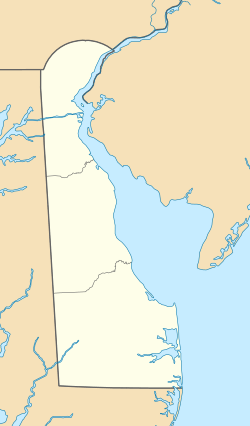Ralph Potato House facts for kids
Quick facts for kids |
|
|
Ralph Potato House
|
|
| Location | Southeast of junction of Roads 493 and 494, near Laurel, Delaware |
|---|---|
| Area | 0.1 acres (0.040 ha) |
| Built | c. 1915 |
| MPS | Sweet Potato Houses of Sussex County MPS |
| NRHP reference No. | 90001698 |
| Added to NRHP | November 15, 1990 |
The Ralph Potato House is an old building near Laurel in Sussex County, Delaware. It's a special kind of building called a "potato house." This house was built around 1915. It is one of the very few potato houses still standing today.
Potato houses were important for farmers long ago. They helped keep potatoes fresh for a long time after they were harvested.
Contents
What is a Potato House?
A potato house was a special type of storage building. Farmers used them to store potatoes, especially sweet potatoes. These buildings were designed to keep the potatoes at the right temperature. This was important to stop them from spoiling or freezing.
The Ralph Potato House is a one-and-a-half-story building. It has a pointed roof at the front, which is called a gable front. It was built using a method called "balloon frame" construction. This means its walls were made with long pieces of wood that went from the bottom to the top. The building sits on a strong brick foundation.
How Did They Work?
Potato houses had several unique features to protect the crops:
- Double Walls: They had two layers of walls. This helped to insulate the building, keeping it warm in winter and cool in summer.
- Inside Chimney: There was a brick chimney inside. This was used to create a little heat when it got too cold. It kept the potatoes from freezing.
- Shuttered Windows: The openings, like windows, had shutters. These could be closed tightly to control the temperature and light inside.
- Gaps in Floors: Sometimes, there were small gaps between the floorboards or walls. These helped with air circulation, which was also important for storing potatoes.
These features worked together to create the perfect environment for storing potatoes. This allowed farmers to sell their crops throughout the year.
Protecting History
The Ralph Potato House is considered a very important historical building. It shows us how farming was done in the past. Because of its importance, it was added to the National Register of Historic Places in 1990.
What is the National Register?
The National Register of Historic Places is a list of buildings, sites, and objects in the United States that are important in history, architecture, archaeology, engineering, or culture. When a place is on this list, it means it's recognized as special. It often helps protect these places for future generations to learn from and enjoy. The Ralph Potato House is a great example of this effort to save our history.
 | May Edward Chinn |
 | Rebecca Cole |
 | Alexa Canady |
 | Dorothy Lavinia Brown |



